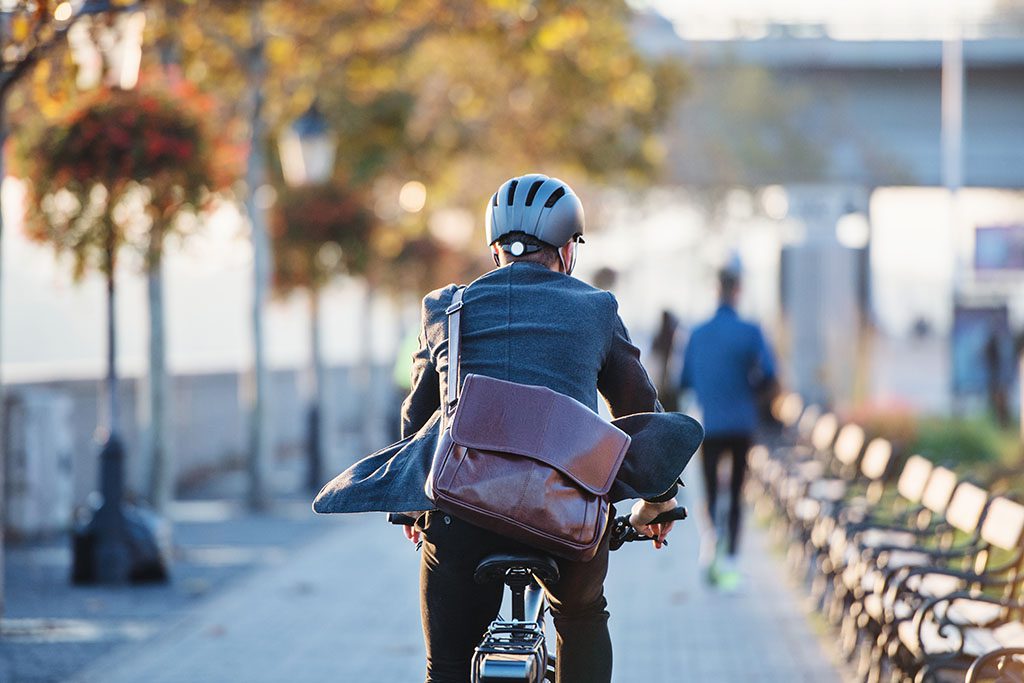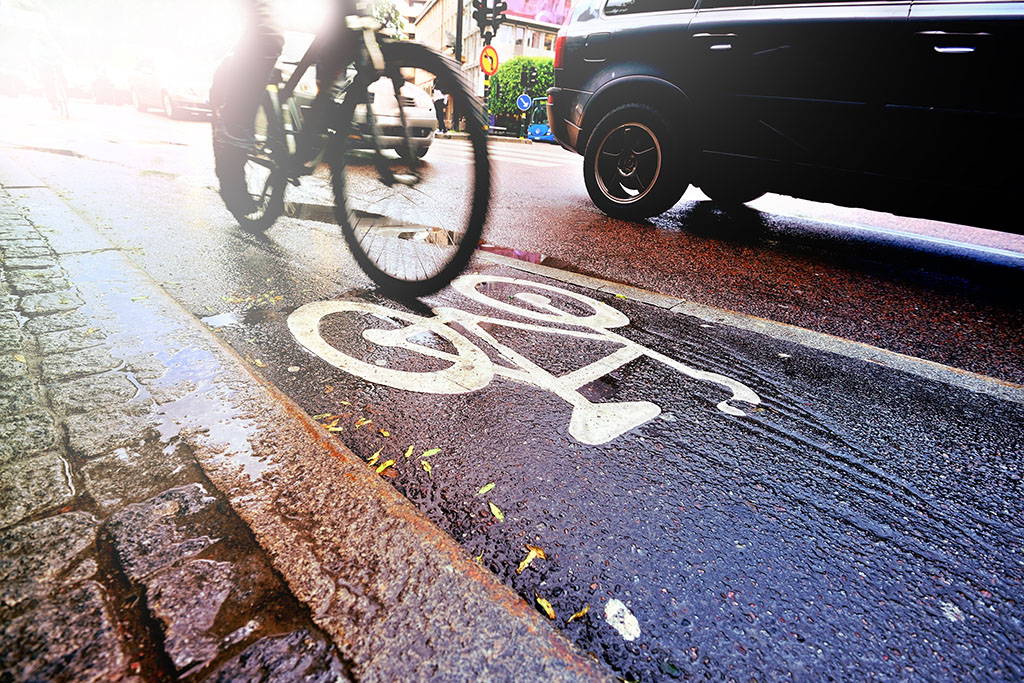Go To Work On A Bike – Why You Should Be Cycling To Work

Cycling in the UK has seen a bit of a revival over the last few years; in 2019, UK households spent approximately £1.56 billion on bikes, and cycling levels have increased by 23.7% in the last ten years. This is partly due to the pandemic; people suddenly had more time on their hands, were limited in what they could do in their leisure time, and were anxious about public transport, but that was closely followed by the cost-of-living crisis, with 30% of adults reporting cutting down on non-essential journeys due to an increase in the price of fuel.
As more of us are opting to leave our cars at home, we thought we’d have a look at some of the benefits of cycling to work; so fasten your cycle clips, strap on your panniers, and find out why you should be cycling to work.
It’ll Save You Money
If you’ve filled your car up recently, you’ll know how eye-watering fuel prices are. The average price for unleaded petrol is currently around 144p a litre, although this can vary around the country, particularly if you live in or around London. Bus and train fares aren’t much better, so it’s no surprise that people are looking at alternatives.
Research suggests that you could save £750 a year by cycling to work, although of course, if you don’t already own a bike you need to factor in the cost of buying a new one, but it’s worth checking if you employer is registered with a Cycle to Work Scheme such as such as Bike2Work Scheme, Cycle Solutions or Cyclescheme. If you already own a bike and want an easy way to calculate how much money you’re saving by cycling to work, you could use this handy Cycle to Work Calculator.
It’s Healthier
Cycling to work is a good way of incorporating more exercise into your day; if it takes you 20 minutes to cycle to work, by the time you get home you’ll have done 40 minutes without having to join a gym; you just need to do that a few times a week to be well on your way to hitting the government recommended target of 150 minutes of exercise a week. You could even download Strava so that you can compare your commutes and see how you’re improving/beat your friends.
It’s a low-impact exercise and depending on how fast you cycle, the type of cycling you do (are there lots of hills?) and your weight, you could burn between 400 – 750 calories per hour. Cycling can also reduce the risk of heart disease, type 2 diabetes and stroke; studies show that compared to travelling by car, cycling is associated with a lower risk of dying from both cardiovascular disease and cancer.

You’ll Save Time
We all know that cars are faster than bikes, but this isn’t always the case when you’re cycling through a town or city; for example, studies show that cyclists in London travel at around 14mph on average, compared to the 7.6mph average that a car travels.
You can easily dodge the traffic jams (while also making them smaller by removing your car from the road) and it’s also easier to park a bike once you get to work; you can fit ten bikes in the space it takes to park one car.
It also saves you time if you’re a recreational cyclist, letting you get some miles in when you would otherwise be sitting in your car, meaning you can space your cycling out. There are plenty of strength exercises that will improve your cycling so you get more out of your commute.
You’ll Save The Planet
Cycling has a carbon footprint of around 21g of CO2 per km, which is less than walking or taking the bus, and ten times lower than driving, even taking into account the environmental impact of bike production.
Reducing the number of cars on the road will result in less traffic jams and lower CO2 emissions, making the world a healthier place; currently, around 40,000 deaths a year are associated with pollution.
Less Stress
A survey by Cycle Plan showed that 75% of respondents felt that their mental health improved after cycling, and cycling has been linked to lower stress levels, with commuters who cycled four or more times a week at a lower risk of stress.
Both exercise and fresh air have a positive impact on mental well-being, and exercise raises serotonin and dopamine levels. Fresh air and exercise also help you get a better night’s sleep while giving you a sense of well-being, giving your self-esteem a boost at the same time. Ditching the car also makes you more aware of your surroundings and can help boost your concentration.

Tips For Cycling To Work
Plan your route – you could try it out on a weekend so that you have an idea of how long it’s going to take, how strenuous it is etc.
Cycle with someone else – do you have a colleague who lives near you? Rope them in too, if there are two of you you’re more likely to do it on those days when you’re not feeling very motivated.
Brush up on your cycling skills – if you haven’t been near a bike since passing your cycling proficiency test when you were 10, and are feeling a bit rusty, you could always do a refresher course before you hit the road; Bikeability does courses for adults.
Time it right – pick a day when you don’t have a big meeting first thing, to allow for delays and give you time to get changed and lock your bike, nobody wants to see you collapse into a meeting room, red and sweaty.
Take spare clothes – it’s a good idea to have something to change into, you could get sweaty, or it might be rainy, so find out what facilities there are at work; showers etc.
Check your equipment – make sure you have bike lights, locks, a helmet, waterproofs and panniers/a bike basket.
As you can see, there are plenty of reasons to swap four wheels for two. Whether you’re a seasoned cyclist, or new to the open road, once you’ve escaped from behind the wheel there’s no going back and you may find that you’d forgotten how much fun cycling can be. (Take a look at some of the best family bike rides in the UK for inspiration for weekend rides, we’ve also found some bike rides on our own patch, Yorkshire).
If we’ve convinced you to get pedalling, and what’s not to like about being fitter, richer, happier and more environmentally friendly, then you might want to think about taking out bicycle insurance. We’ve created a standard package that you can customise with a range of additional benefits, making it fit your needs as tightly as your favourite lycra cycling shorts. So cycle over today and become part of the cycling to work gang.
* This blog is in no way sponsored, endorsed, administered by, or associated with Cyclescheme, Cycle to Work Calculator, Cycle Solutions, Bike2Work, Strava or Bikeability.
All content provided on this blog is for informational purposes only. We make no representations as to the accuracy or completeness of any information on this site or found by following any link on this site. We will not be liable for any errors or omissions in this information nor for the availability of this information. We will not be liable for any loss, injury, or damage arising from the display or use of this information. This policy is subject to change at any time.
We offer a variety of cover levels, so please check the policy cover suits your needs before purchasing. For your protection, please ensure you read the Insurance Product Information Document (IPID) and policy wording, for information on policy exclusions and limitations.



